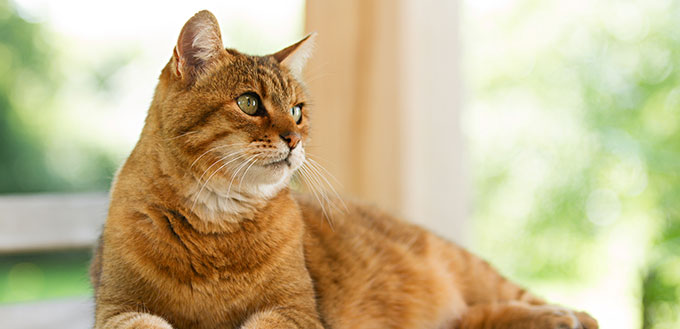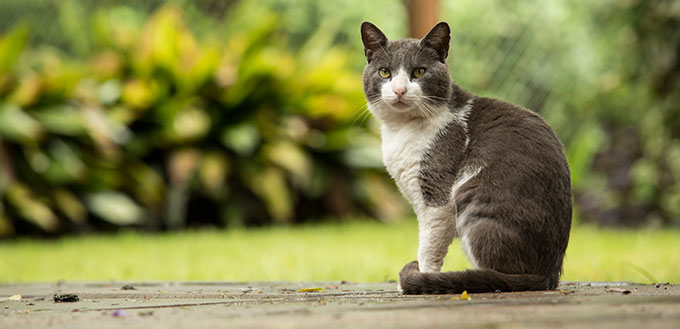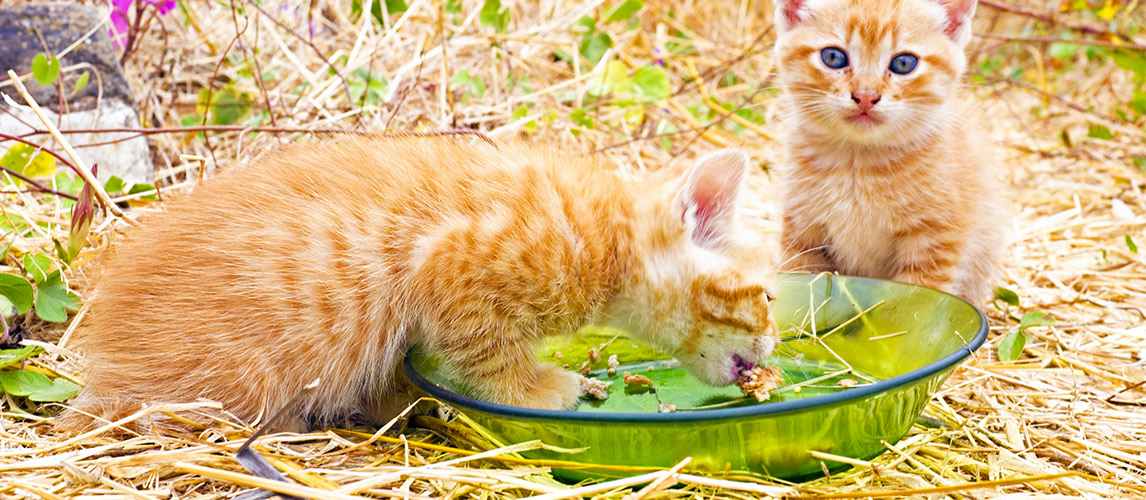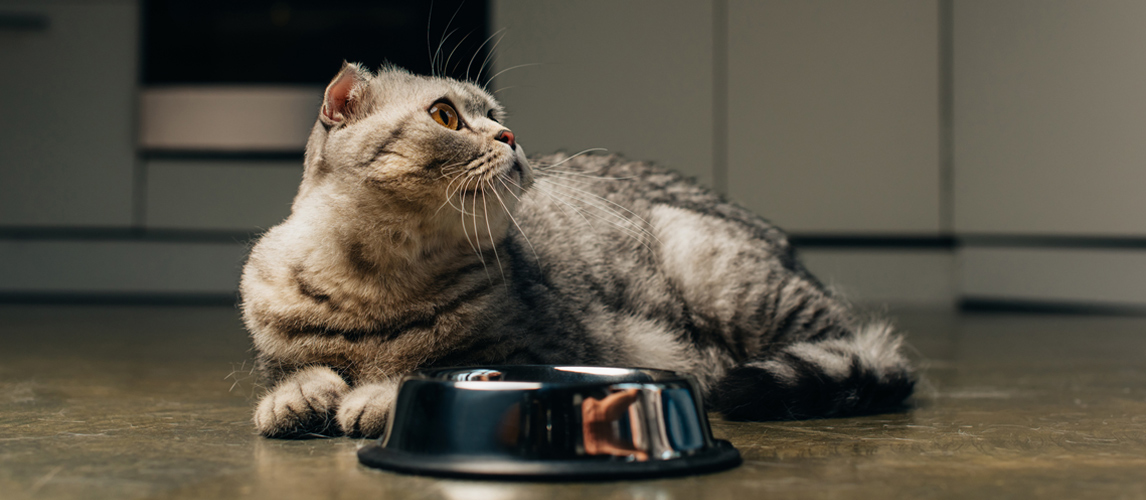There’s nothing quite like a cat cuddle with your pet, but what if you suspect there’s more cat to cuddle than there should be? While your kit’s weight will most likely change during the course of their life, it’s important to know how much a healthy cat weight is, and what the real signs are that your puss may be carrying more chunk than is good for them.
We ask the question, ‘how much should my cat weigh?’ and explore what you can do as a responsible pet owner to keep your kit on an optimum weight path.
What is a Healthy Weight for a Cat?
The ideal cat weight really does depend on your kit’s breed but on average, a healthy weight for an adult cat is around 10 pounds (4.5 kilos). However, you will need to make some allowances for the type of cat you have as, for example, a fine Siamese is going to weigh less at around five pounds while larger breeds such as a Persian or a Maine Coon can still be at a healthy cat weight at 25 pounds. The key is to know your breed and what is the average cat weight for them, and work from there. Another good way to know how much your cat should weigh is to speak to your vet as they also use a system called the Body Condition Score or BCS. Pet owners also use this method to assess their cat’s weight at home – more on this later.
The Importance of Maintaining a Healthy Weight
Just like humans, over-eating and body weight gain in cats can lead to a host of issues if left unchecked. However, not all cats are equal and when it comes to obesity, certain cats are at a greater risk of piling on the pounds. These include older cats with reduced activity levels, male cats, felines that have been sterilized, cats who are free-fed and so have the opportunity to over-eat and indoor cats, who don’t get the chance to move and exercise as much as their outdoor counterparts.
Related Post: Cat Food for Indoor Cats
There are also significant health risks to having an overweight cat, as obesity can leave them prone to medical conditions, including
- Feline diabetes
- Pancreatitis
- Joint problems
- Heart disease
- Skin problems
But when your cat is at its optimum weight, they will enjoy a healthy, active, and hopefully, long life.
Take a look at our article on the Best Cat Food for Pancreatitis.
Signs Your Cat May Be Overweight
The most obvious way to know if your cat is overweight is by how they look but this can sometimes be a little misleading. Their appearance may be puffed up by their luxurious fur, or as you live with them day to day, any weight gain may not be so obvious. To be sure, you can follow the basics of the Body Condition Score. The main signs to look out for include:
- Their belly and shape – does their tum sag or have they lost their normal feline ‘waist’?
- Running your hands over their body, can you easily feel their ribs and shoulder bones, or can you feel a layer of fat first?
- Energy – is your cat less inclined to get active or play or increasingly lethargic?
A healthy cat should have an hourglass shape when viewed from above and their tum shouldn’t sag down. You should also be able to feel their ribs and be able to count them with your fingers. If you can’t then your kit is above its healthy weight. But if you can visibly see their ribs through their surface fat, then they could be underweight. The final confirmation is to pop your cat onto some pet scales to see if the dial goes above (or below) the average cat weight for their breed.
How to Help Your Cat Shed Those Extra Pounds
Obesity in cats is not always just a result of over-feeding, there can be other factors in play which can lead to your kit’s weight slowly creeping up. Too many treats, lack of exercise, and boredom can all play a part in the problem. Cats are by nature, agile and active so carrying too much weight can really slow them down, leading to a vicious cycle which results in an overweight, unhappy and anxious kit. The best way to keep your cat at a healthy weight is to monitor their food and be aware of any changes in their mood or eating behavior. Here are some other essential tips to keeping your cat lean, active and healthy:
- Make sure your cat is on the right diet for their life stage as well as activity levels
- If they are putting on weight with their normal diet, look at reducing the portions or swap to a cat food specifically formulated for weight loss
- Always ensure their diet is still supplying them with all the nutrition, calories, vitamins and minerals they need for good health
- Cut down on treats and don’t be tempted to give them titbits of your own food
- Look to give your cat greater stimulation to stave off boredom – automatic pet feeders and puzzle feeders are a good idea and will help them to slow down when they eat
- Increase their activity levels to balance out their calorie intake – not only will it help to keep them fit and lean but will help to maintain a healthy weight
- Play with your cat before you feed them – cats will naturally hunt for their food so associated playtime will mimic this active behavior
- Keep a cat weight chart to measure their progress and nip any weight gains in the bud
When to Ask for Help
If you are concerned in any way about your cat’s weight, it’s always a good idea to speak to your vet for advice before making any radical changes to their lifestyle or diet. And if you notice your cat is losing or adding weight suddenly, then ask your vet to do a full health check, especially if the weight gain/loss is accompanied by other symptoms such as changes in mood, coat condition or digestive issues as it could all indicate underlying health problems. But if your cat is given a clean bill of health, your vet will still be able to help you come up with the right plan to safely get your kit’s weight under control with a tailored diet and exercise plan specific to the needs of your own special pet. And that is the recipe for success.
You may also like to check out some ways to keep your cat active during the winter.
Sources:
- Dr. Lisa M. Freeman, Think You Have a Fat Cat? The Ten Things You Need to Know – Cummings Veterinary Medical Center
Note: The advice provided in this post is intended for informational purposes and does not constitute medical advice regarding pets. For an accurate diagnosis of your pet's condition, please make an appointment with your vet.









